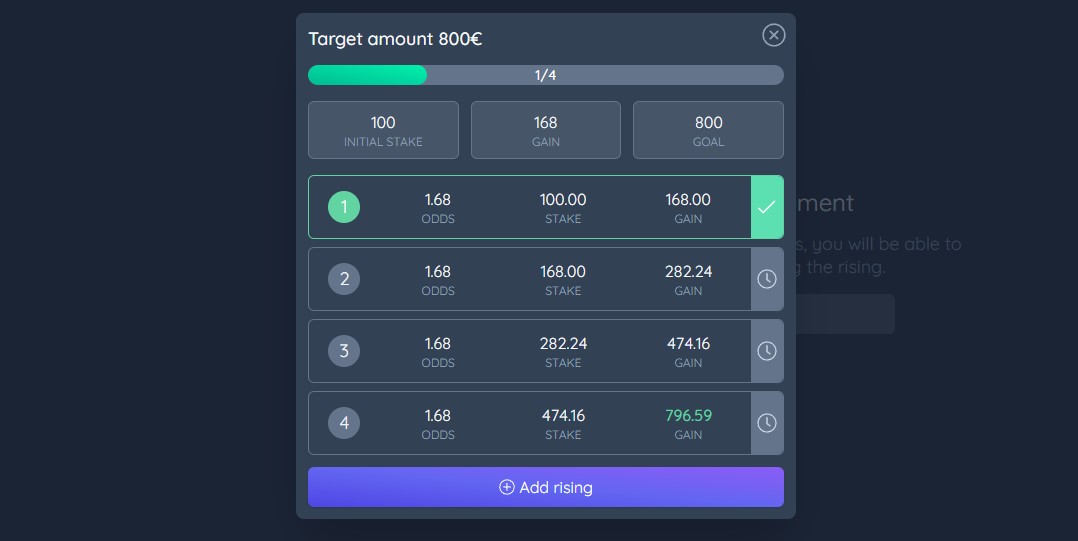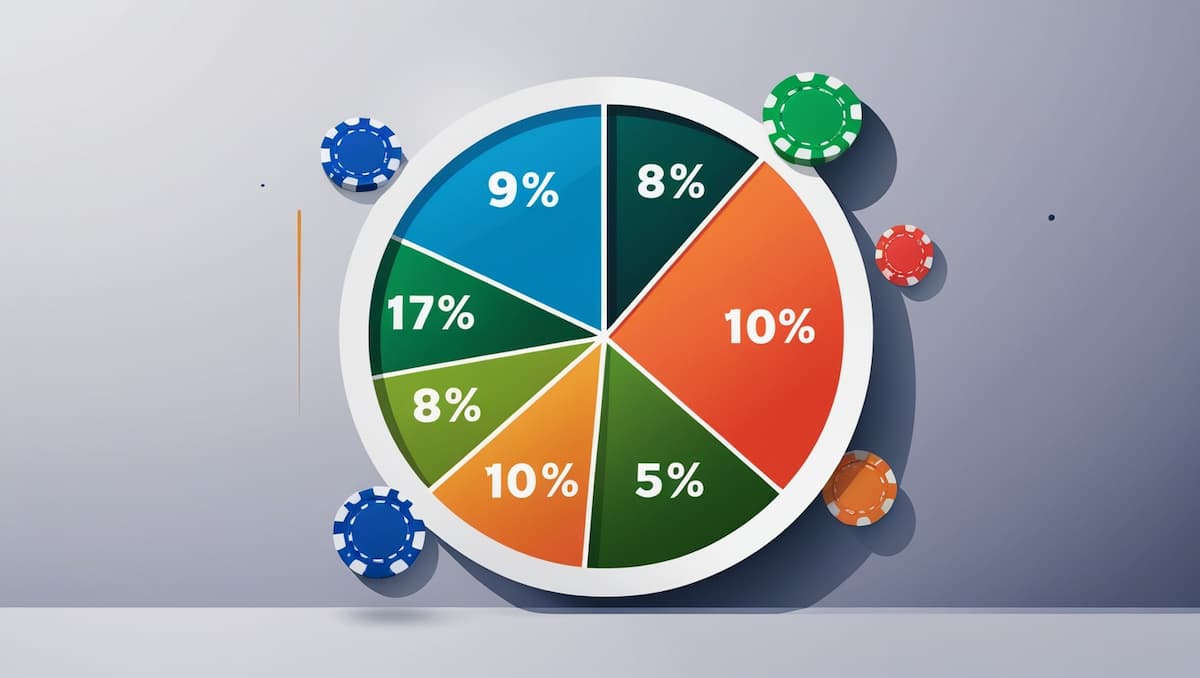Bankroll Management in Sports Betting – Strategies, ROI & Pro Tips
Managing your bankroll is key to making money in sports betting. It means controlling how much money you use for bets through proper bankroll management. This helps you keep betting without risking too much money.
Knowing how to apply effective bankroll management can significantly improve your betting success. This article will cover basic strategies for both new and experienced bettors. By using these strategies, you can increase your chances of making money and continue betting sustainably over the long term.
What is Bankroll Management and Why It Matters
Bankroll management is a must for successful sports betting. It helps you avoid losing too much money and keeps your finances safe while betting.
It’s about setting a budget for betting, planning your bets carefully, and never betting more than you can afford.
Defining Your Bankroll – How much is a bankroll?
A bankroll is a set amount of money for betting.
Knowing how much you have for betting helps you stay within your limits. This keeps your betting separate from your everyday money, protecting your finances.
Why Bettors Need a Clear Strategy
Bettors need a solid betting plan. One important strategy is setting limits and sticking to them. This stops you from betting impulsively and helps you make better choices.
Planning for wins and losses helps you handle the ups and downs of betting. This way, you can enjoy betting for a long time without getting tired of it.
How Bankroll Impacts Long-Term Success
Bankroll management is crucial for long-term betting success. It acts as a safety net against big losses and lets you invest in different betting opportunities.
This approach helps you bet consistently and avoid losing all your money quickly. It shows the difference between experienced and new bettors.
Understanding bankroll management is very important. It’s not just about saving money; it’s about enjoying betting as a thoughtful hobby, not a reckless risk.
How Much is a Bankroll in Betting?
The size of a betting bankroll depends on your financial situation, goals, and risk tolerance. There’s no fixed amount — it can be as little as $50 for casual bettors or several thousand pounds for high-stakes punters. What matters most is that your bankroll is money you can afford to lose and is separate from your everyday expenses. Properly sizing your bankroll helps you stay disciplined and avoid emotional betting decisions.
What is a Bankroll in Betting?
A bankroll in betting is the total amount of money you set aside specifically for gambling or sports betting activities. It serves as your budget and should be managed carefully to ensure long-term sustainability. Managing your bankroll effectively helps protect you from large losses and allows for more consistent betting performance over time.
Bankroll Meaning in Betting
In betting terms, your bankroll is your dedicated fund for placing bets. It’s not just a number — it’s a tool that supports smart wagering strategies. The way you use your bankroll, through systems like flat betting or unit betting, can greatly impact your chances of long-term profitability and reduce the risk of going broke during losing streaks.
What Does Bankroll Mean in Betting?
When someone talks about a bankroll in betting, they’re referring to the pool of money reserved exclusively for wagering. It’s a key concept in responsible betting because it represents your financial limit. Managing your bankroll properly means choosing stake sizes that align with your total funds and betting strategy, helping you stay in control no matter how the results unfold.

Bankroll Management Models
Sports betting needs more than just luck and skill. It also needs solid plans to guide your financial decisions on the best betting sites. Different bankroll management models offer this framework, helping you manage your betting funds effectively.
The Constant Percentage Model is a simple yet effective approach. It involves betting a fixed percentage of your bankroll on each bet, no matter how confident you are.
This method keeps your bets in line with your bankroll, reducing the risk of big losses.
The Kelly Criterion is another popular method. It goes beyond the Constant Percentage Model by considering the odds and your edge over the bookmaker.
It helps find the best bet size to grow your bankroll over time. It considers the chance of winning and the odds value. This makes betting more strategic and profitable.
Effective betting models help punters improve their betting.
Choosing the right bankroll model greatly affects your betting success. It fits your risk level and financial goals. Using these strategies helps you stay disciplined and increase your chances of winning in the long run.
Efficient Bankroll Management
Creating a solid bankroll management strategy is key for successful betting. It applies to both small bets on football weekends and big stakes at the Cheltenham Festival. It keeps your money safe, boosts your long-term returns, and reduces emotional betting.
Setting a Starting Bankroll
Start by setting aside a specific amount for betting. This is your bankroll and should not touch your personal savings or daily expenses.

For example, Josh from Los Angeles sets aside $500 for the football season. This money won’t affect his bills or lifestyle. By setting aside this amount, he avoids betting based on financial stress.
Betting in Units: Explained for Punters
Using a unit system adds structure to your betting. A unit is a small part of your bankroll, usually 1-5%.
Emma, a seasoned tennis bettor, uses a 2% unit of her $1,000 bankroll. So, each bet is $20. She might bet more on confident wagers and less on unsure ones.
This method lets you adjust your bets wisely. If Emma’s bankroll grows to $1,500, her base unit becomes $30. This keeps her bets in proportion to her capital.
Flat vs Percentage Betting
There are two main bankroll models: flat betting and percentage betting.
- Flat Betting: You bet the same amount on every bet, no matter the outcome. It’s good for beginners or those who like less risk.
Example: Jack bets $10 on every Premier League match, regardless of his streak. This steady approach lowers risk. - Percentage Betting: You bet a fixed percentage of your current bankroll. Example: Lucy bets 3% of her bankroll per wager. Starting with $300, her first bets are $9. As her bankroll grows, so does her stake. This system allows for natural scaling and limits losses during losing streaks.
Using a Confidence Model
The confidence model adjusts stake size based on how strongly you rate your bet.
Example: David analyses three horse races. In the first race, he finds strong form data and inside stable tips, so he assigns a 5-unit stake ($50). For the second race, he has limited data and only moderate confidence—he bets 1 unit ($10). In the third race, he’s moderately confident, so he stakes 2 units ($20).
This model optimises potential returns by investing more in bets you believe in and protecting capital on speculative ones.
Real-Life Scenario – Combined Strategy in Action
Imagine Sarah, a New York-based bettor, sets a $1,000 starting bankroll. She uses a 1-5 unit system, where 1 unit = $20:
- For an England vs. Scotland Euro 2025 qualifier, she’s extremely confident after researching injuries, team form, and weather conditions. She places a 4-unit bet ($80).
- She also likes an underdog bet on a League One match but sees value with lower confidence. She places 1 unit ($20).
- Her total stake that week is $100—just 10% of her bankroll, within a reasonable risk threshold.
By using units, confidence weighting, and emotional control, Sarah avoids overexposing her bankroll, even when placing multiple bets.
Proven Bankroll Management Systems
Mastering bankroll management systems is crucial for long-term success in sports betting. These strategies help you make informed decisions, manage your funds efficiently, and sustain profitable betting habits. Let’s explore two popular approaches and the importance of tracking your betting performance to enhance your betting ROI.
The Percentage Model of Bankroll Management
The Percentage Model is a favourite among seasoned bettors. This system advocates placing a consistent percentage of your overall bankroll on each bet.
This percentage can be adjusted depending on your confidence level, but a conservative range of 1-3% is often recommended. This method helps you control the impact of losses and allows your stake to grow proportionally with your bankroll.

The Flat Betting System
In contrast, the Flat Betting System involves placing the same amount on every wager, irrespective of your bankroll size or the odds. This approach promotes stability, reduces the risk of significant losses, and simplifies decision-making. While this system may appear less aggressive, it prevents the emotional betting that often accompanies larger stakes.
ROI and Tracking Your Performance
Understanding and monitoring your betting ROI (Return on Investment) is essential for refining your betting strategies.
By tracking your betting performance, you can identify patterns, gauge the effectiveness of different systems, and make data-driven decisions. Always record every wager, noting the stake, odds, and outcome to create a detailed performance log.
| System | Advantages | Disadvantages |
| Percentage Model | Scalable stakes, reduced risk | Requires careful bankroll tracking |
| Flat Betting System | Stable, straightforward | Potentially slower ROI growth |
Bankroll Management – Dealing with Risks and Smart Wagering
Effective risk management is key for serious bettors. It helps protect your bankroll and keeps you in the game longer. Using smart wagering techniques can reduce losses and make your betting more disciplined.
How to Avoid Chasing Losses
Chasing losses can quickly drain your bankroll. To avoid this, set strict loss limits and stick to your betting plans. This approach strengthens your risk management and keeps your funds safe.
When to Take a Break
Knowing when to take a break is important. Too many losses can cloud your judgment. Taking breaks helps you avoid burnout and improves your betting decisions when you return.
Responsible Betting Practices
Following responsible betting practices is essential. Use tools like deposit limits and self-exclusion to stay safe. These habits promote sustainable betting and protect against financial strain.
Bankroll Management Tips
Effective bankroll management is vital for success in sports betting. Use strategies like hedging and line shopping to improve your bets. Choosing the right sports and bookmakers also enhances your experience.
Hedging and Line Shopping
Hedging involves betting on opposite outcomes to secure a profit or reduce losses. For example, betting on Liverpool and Manchester City in the same season can guarantee a profit, regardless of the outcome.
Line shopping means comparing odds to find the best value bets. If one bookmaker offers 2.10 odds and another 2.25, betting with the second ensures a better return. Using multiple accounts and odds comparison tools makes this easy.
Choosing the Right Sports
Not all sports are equal for betting. Focus on sports you know well for better value. For instance, Championship football or local rugby leagues might offer more value than Premier League odds.
Sticking to familiar sports gives you an edge. You can spot market inefficiencies and make more informed bets. Analyzing specific markets within these sports can also reduce variance and improve your chances of winning.

Protecting Your Bankroll Against Variance
Sports betting variance is a natural part of the game. To protect your bankroll, understand that not every bet will win. Diversify your bets and avoid large stakes on a single event.
For example, instead of betting $100 on one event, split it into smaller bets across different matches or markets. This approach helps manage risk and prevents big losses.
Setting aside 10% to 15% of your bankroll as a safety buffer is also wise. It allows you to recover from losses without going broke. Bankroll protection is about staying in the game long enough to let your strategy work.
Picking the Best Bookmakers
Choosing the right bookmakers is key to managing your bankroll well. Many of the best betting sites offer great odds, lots of markets, and quick customer support. They also have fast payouts, flexible cash-outs, and detailed stats tools.
Some bettors have accounts with four or five bookies to shop for better odds and bonuses. This way, they get the most value and increase their chances of winning.
Privacy-focused bettors might prefer no KYC sportsbooks for betting without ID checks. These sites offer quick sign-ups and withdrawals. But, it’s crucial to check they are safe and licensed.
By comparing what each site offers, you get the best value and increase your chances of winning over time.
Bankroll Management FAQ
How much is a bankroll in sports betting?
A bankroll is the money set aside just for betting. How much you have depends on your budget and betting goals.
What is a bankroll in betting?
In betting, a bankroll is the money you have for bets. Good bankroll management means you can keep betting without risking your financial stability.
What does bankroll mean in betting?
A bankroll in betting is the money set aside for bets. It helps prevent betting more than you can lose.
Why is bankroll management crucial for bettors?
Managing your bankroll is key. It helps plan for losses, keeps your money safe, and leads to long-term success.
How do you define your bankroll?
To set your bankroll, pick an amount you can lose without affecting your daily life. This is your starting bankroll.